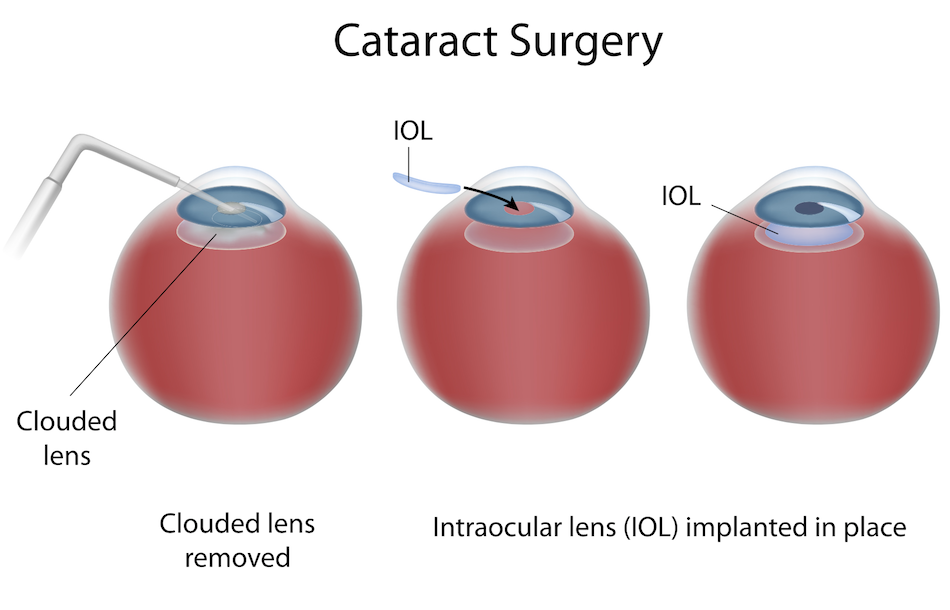Cataract is an eye disease that occurs when the lens gradually loses its transparency. This results in opacification of the lens. The lens, the inner lens of the eye, acts like a camera lens and allows a sharp image to be formed on the retina.
Cataracts are characterized by a progressive but inevitable decrease in visual acuity. Darkening the lens can take years to become embarrassing for the patient.
The first signs of the disease appear with vision problems at first from a distance, a feeling of fog, a change in the perception of colours and contrasts, a doubling of vision with only one eye, hypersensitivity to light (photophobia), difficulty in driving at night due to glare from headlights (decreased twilight visual acuity).
Generally appearing around the age of 55-60, the patient's aging makes it the main cause of this vision disorder. Other secondary factors such as diabetes, smoking, heredity, nutrition, prolonged exposure to the sun's UV rays, eye trauma, eye diseases such as glaucoma can also cause cataracts.
The absence of light passing through the lens does not allow a correction of the discomfort caused by simply wearing glasses.
Only cataract surgery can treat the phenomenon.
Duration of hospital stay
2 to 3 days.
The patient will usually be able to leave after the procedure.
Average length of stay
2 to 3 days.
Precautions should be taken to avoid dry eyes.

Every year, nearly 11 million patients go abroad in search of medical care. At MEDICAIM, we provide our patients with access to the best hospitals and doctors around the world. Contact us to learn more about your treatment options.
Ask for your free quote abroad
Start your medical stay by requesting a quote. Our customer service department will help you find the clinic that best suits your needs and get you a quote.
Cataract surgery is a very common surgical procedure and the results are very satisfactory. First, at least one week before the operation, the ophthalmologist will carry out examinations (ultrasound, optical biometry, etc.) and measurements of the eyeball to determine the power of the implant. An appointment with the anaesthetist is scheduled in order to make any changes before the operation.
Cataract surgery is an outpatient procedure. It takes place in a sterile room under local anesthesia, using anesthetic eye drops or eye gel, so that the patient feels no pain during the procedure. Before the procedure, the patient's pupil will be dilated in order to have access to the lens. The patient's two eyes are never operated on at the same time. On average, cataract surgery requires half an hour of presence in the OR, the procedure itself takes between** 30 and 45 minutes.**
The operation is performed in two steps: extraction of the lens and then placement of the intraocular implant.
The extraction is carried out under an operating microscope. An incision of about 2 mm is made on the cornea. The injection of a viscoelastic gel-type product into the inner chamber will prevent the cornea from collapsing. The surgeon will then make an opening in the anterior capsule of the lens. The next step is called phacoemulsification. This consists of disintegrating the lens into small pieces using ultrasound emission. The lens fragments are then aspirated by an irrigating probe while keeping the capsular sac intact.
The implant (soft lens) is folded and inserted into the eye before unfolding into the crystalline bag held for this purpose. The surgeon checks the waterproofness of the incision and according to, he/she decides whether or not to place a stitch.
It should be noted that there are several types of implants. The most common is the monofocal implant (with a single power). But they can be toric (cases of high astigmatism) or multifocal (to compensate for presbyopia)

For 3 to 4 weeks, the patient will have to pour drops (or ointment) into the operated eye three times a day. Wearing a protective shell is necessary for the first 4 or 5 nights to avoid possible eye trauma. It is recommended that the patient wear sunglasses to protect the retina from the sun's rays.
The patient will consult the ophthalmologist for a post-operative examination and the optical correction will be reviewed from one month after the operation. The possible operation of the second eye can also be scheduled after one week and more without any inconvenience.
As with any surgical procedure, the risks associated with anesthesia are to be known. But in the vast majority of cases, cataract surgery is painless and allows for a very rapid improvement in vision.
Other secondary risks exist such as eye infection, increased intraocular tension, retinal detachment… But they are uncommon.
The patient may experience cataract symptoms again. This secondary cataract corresponds to a darkening of the crystalline envelope, the one containing the implant placed. This defect will be quickly and definitively corrected by the doctor using a YAG laser.
MEDICAIM takes care of the follow-up on a case-by-case basis. www.medicaim.com
MEDICAIM is looking for the best specialists for you and we will offer you several renowned doctors.
MEDICAIM organizes your entire stay for you: post-operative nursing care, biological follow-up, therapeutic, nutritional and psychological support.
Any additional questions? Ask your MEDICAIM doctor about it: careteam@medicaim.com
Some needs and conditions are more complex than others. In case of doubt, please send us additional information to establish a customized quote.
Ask for a quoteCertains besoins et pathologies sont plus complexes que d’autres. En cas de doute, faîtes-nous parvenir des informations complémentaires pour établir un devis sur-mesure.
Demander un devisEntrust us with your medical file and it will be examined by a specialist doctor. The goal?
Allow you to evaluate all your treatment options.